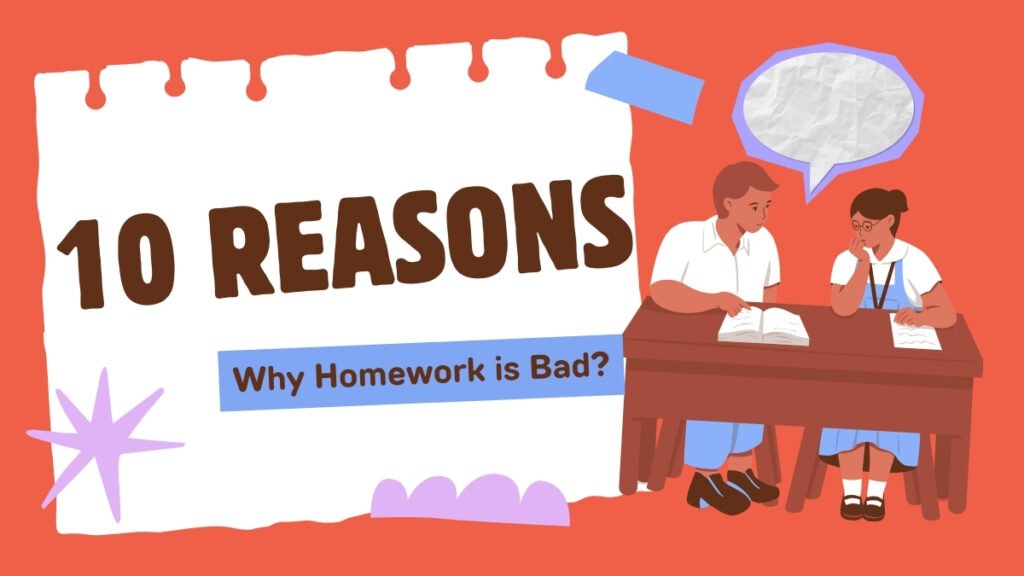Unveil the top 10 reasons why homework is bad for students. Investigate the adverse effects of excessive homework on both learning and well-being.
Homework presents a significant hurdle for numerous students. Following an extensive day of classes, the additional worksheets and tasks can become burdensome. However, does homework truly serve its purpose?
Despite its potential to solidify classroom teachings, studies reveal profound drawbacks associated with an excessive homework load. Let’s delve into 10 reasons why homework may be causing more harm than good.
Definition of Homework
Homework, or schoolwork done outside class, encompasses various assignments given by teachers to be finished at home. These tasks differ based on the subject and the student’s age but typically include:
- Reading assignments
- Writing exercises (essays, reports, etc.)
- Math problems
- Project work
- Reviewing material before a test
Brief History of Homework
The history of homework unveils a multifaceted narrative, stretching beyond a single inventor. Here’s a glimpse into its evolution:
Ancient Origins
Early forms of homework can be traced back to civilizations such as:
- Ancient Egypt: Where students engaged in hieroglyphic writing exercises.
- Ancient Greece: Notable thinkers like Plato and Aristotle advocated for written tasks to foster intellectual growth.
The Nevilis Myth: Though often attributed as the “father” of homework, Roberto Nevilis, a 16th-century Venetian educator, lacks substantial historical evidence supporting this claim.
Early American Disdain
In the early days of America, with limited access to formal education and an emphasis on household chores and agricultural work, homework was not widely embraced.
Modern Homework Emerges (Late 19th Century)
Horace Mann, an American educational reformer, drew inspiration from Prussian educational methods, which included homework. He championed its integration into the American educational system, where it gradually became a standard practice.
Ongoing Debate
The efficacy and purpose of homework persist as contentious subjects. Research indicates it may not yield significant benefits for younger students. Discussions persist on determining the optimal balance and leveraging homework strategically to enrich learning.
10 Reasons Why Homework is Bad PDF
Purpose of Homework in Modern Education
Homework in today’s schools has its pros and cons. Here’s why teachers give it:
| Benefit | Description |
|---|---|
| Practice | Homework helps you practice what you learn in class. |
| Independence | It teaches you to learn on your own. |
| Explore | You can dive deeper into topics. |
| Prep | It gets you ready for new lessons. |
| Time Management | Balancing homework teaches you to manage time. |
| Family Connection | Parents can see what you’re learning and help out. |
Just remember, while homework has its perks, it should be manageable and not too overwhelming.
Controversy Surrounding Homework
Homework: a big debate in education circles. Let’s break it down:
Against Homework
| Challenge | Description |
|---|---|
| Stress | Too much homework stresses students out. |
| No Free Time | It takes away time for fun and sleep. |
| Not Fair | Some kids have more help than others. |
| Kills Creativity | Boring tasks can squash creativity. |
For Homework
| Benefit | Description |
|---|---|
| Practice | Helps you get better at what you learn. |
| Be Independent | Teaches you to learn on your own. |
| Learn More | Lets you explore topics deeper. |
| Time Management | Helps you manage your time. |
| Connects with Parents | Keeps parents in the loop. |
Balance is key
Homework should be fun, helpful, and just the right amount.
10 Reasons Why Homework is Bad
Check out 10 reasons why homework is bad:-
1. Stress and Anxiety
Overwhelming Workload: Students get stressed when they have too much homework from different subjects, and it makes them anxious.
Example: A high schooler might feel overwhelmed with an English essay, math problems, and a science test all due at once.
Time Pressure: Homework deadlines add pressure to finish quickly, making stress and anxiety worse.
Example: A student may worry about finishing a long assignment before the due date while dealing with other responsibilities.
2. Lack of Time for Other Activities
Extracurricular Activities: Homework can eat up time needed for sports, clubs, or hobbies.
Example: A student who loves playing piano may have to sacrifice practice time for homework.
Family Time: Lots of homework means less time with family, which can hurt relationships.
Example: Missing out on family dinners or outings because of homework.
3. Negative Impact on Health
Physical Health Issues: Too much sitting and staring at screens for homework can cause headaches, eye strain, and back pain.
Example: A student may get frequent headaches from staring at a computer screen for hours.
Mental Health Concerns: Stress from homework can lead to depression, anxiety, and feeling burned out.
Example: Feeling overwhelmed by assignments can make a student feel hopeless and emotionally drained.
4. Diminished Family Time
Lack of Bonding: Homework takes away time for families to talk and connect.
Example: Missing out on conversations with parents or siblings because of homework.
Disrupted Family Dynamics: Homework can cause arguments and tension at home.
Example: Arguments might happen when homework interferes with family plans or expectations.
5. Limited Opportunities for Exploration
Pursuing Interests: Too much homework leaves little time for hobbies and passions.
Example: A student who loves photography struggles to find time for it because of homework.
Personal Growth: Exploring interests outside school helps personal development, but too much homework gets in the way.
Example: Missing out on experiences that help a student learn about themselves because of homework.
6. Inequity
Access to Resources: Not all students have the same access to things like books or the internet for homework.
Example: A student without internet at home struggles with online research for a project.
Academic Support: Some students don’t have extra help outside of school, making homework harder.
Example: A student without a tutor or extra resources finds it tough to understand homework.
7. Reinforcement of Inequality
Widening Achievement Gap: Homework can make the gap between high and low achievers bigger.
Example: A student with more resources consistently gets better homework grades than one without.
Socioeconomic Factors: Differences in money and resources can make homework harder for some students.
Example: A student from a poor neighborhood struggles to finish homework without quiet space or materials.
8. Reduced Engagement and Interest
Boring Tasks: Homework that’s repetitive or dull makes students lose interest.
Example: Endless worksheets or memorization tasks can make students not want to learn.
Lack of Relevance: Homework that doesn’t feel useful or connected to real life doesn’t engage students.
Example: Students wonder why they have to do certain homework tasks that don’t seem to matter outside of class.
9. No Guarantee of Mastery
Superficial Understanding: Doing homework doesn’t always mean a student understands the material.
Example: A student might copy answers without really knowing what they mean.
Missed Learning Opportunities: Rushing through homework means missing chances to learn deeply.
Example: Skimming readings to finish a worksheet on time means missing out on understanding.
10. Negative Impact on Relationships
Strained Student-Teacher Relationships: Too much homework can make students and teachers frustrated with each other.
Example: A student might get upset with a teacher who gives too much homework.
Peer Competition and Comparison: Homework can make students feel like they have to compete with each other.
Example: Students might feel like they’re not good enough if their classmates always do better on homework.
Alternatives to Traditional Homework
Homework. Just hearing the word can trigger sighs and eye rolls from students everywhere. But what if there were ways to encourage learning outside the classroom that were actually exciting, effective, and didn’t involve endless worksheets?
Here are some fresh alternatives to traditional homework that can ignite curiosity and reinforce understanding:
Dive into Projects
Let students explore topics through hands-on projects! They can create presentations, models, experiments, or even artistic pieces. This approach promotes research, critical thinking, and teamwork – all crucial skills.
Real-Life Connections
Link classroom lessons to real-world scenarios! Assign tasks where students apply what they’ve learned to solve everyday problems. This boosts engagement and shows the practical side of their education.
Choice Boards
Give students the power to choose! Offer a range of activities related to the week’s lessons, letting students pick tasks that grab their attention. This caters to different learning styles and keeps motivation high.
Digital Learning Games
Infuse learning with fun through educational games and activities! Apps, websites, and certain video games can offer interactive practice and reinforce concepts in a fresh way.
Reading Pleasure
Cultivate a love for reading! Instead of specific texts, let students select books that captivate them. This nurtures a lifelong passion for learning and enhances reading skills.
Unleash Creativity
Encourage artistic expression! Assign tasks like writing stories, poems, or songs linked to the curriculum to deepen understanding and tap into students’ creative sides.
Reflective Learning Logs
Foster self-awareness and assessment! Have students maintain learning logs where they jot down their understanding, challenges, and “aha” moments. This helps them track progress and pinpoint areas needing more attention.
Peer Collaboration
Harness teamwork’s power! Assign projects or activities that promote collaboration, discussion, and mutual learning among students. This cultivates communication and teamwork skills.
Community Connections
Tie learning to the community! Tasks involving volunteering, interviewing local figures, or exploring local history create a deeper link to the world around them.
Family Fun
Bridge school and home life! Assign activities for families to do together, reinforcing concepts in a enjoyable, family-centered way. This encourages communication and strengthens the learning bond.
Remember, the key is to make alternatives engaging, relevant, and aligned with learning objectives. By swapping out memorization for active learning, these alternatives can transform homework into a springboard for exploration and deeper comprehension.
Expert Opinions
The homework debate has two sides. Here’s what some experts say:
Arguments Against Lots of Homework
Alfie Kohn: Homework stresses kids out and makes them like learning less. He says kids should play more.
Jessica Lahey: Homework can make educational differences bigger. She thinks we should focus on mastering things, not just doing lots of work.
Arguments for Good Homework
Paul Cooper: Homework should be short, focused, and help kids practice what they’ve learned.
Harris Cooper: Homework can help older kids, especially in subjects like math. But it should be balanced, not too much.
Finding the Right Mix
National PTA: Homework can be hard, but it’s important for parents, teachers, and students to talk about how much is enough.
The Need for Research
Experts say we should keep studying homework to see what works best for different kids.
Even though we might not settle the homework debate, listening to different ideas and staying up-to-date can help us make homework better for everyone.
What are 10 disadvantages of homework?
Check out the 10 disadvantages of homework:-
| Challenge | Description |
|---|---|
| Stress | Homework can stress students out. |
| Less Free Time | Homework leaves less time for fun. |
| Family Fights | Homework can cause arguments at home. |
| Boring Tasks | Homework can be dull and kill creativity. |
| Unequal Help | Not all students get the same support at home. |
| Not Always Helpful | Homework might not help younger kids much. |
| No Time for Passions | Too much homework leaves no time for hobbies. |
| Test Focus | Some homework is just about memorizing for tests. |
| Hard on Teachers | Grading homework takes teachers’ time. |
Tiredness: After a long day, students might be too tired for good homework.
Why is no homework good?
Check why no homework is good:-
| Benefit | Description |
|---|---|
| Practice | Homework helps reinforce what students learn in class. |
| Preparation | It gets students ready for new lessons. |
| Independence | Doing homework teaches kids to work on their own. |
| Time Management | It helps them learn how to manage their time. |
| Parent Involvement | Homework keeps parents connected to what kids are learning. |
But it’s important to balance it. Here’s how:
| Strategy | Description |
|---|---|
| Quality over Quantity | Focus on meaningful assignments. |
| Variety | Offer different types of homework. |
| Keep it Short | Short tasks can be just as effective. |
| Make it Relevant | Connect homework to real life or student interests. |
By finding this balance, homework can be a helpful tool without being overwhelming.
Conclusion
While homework serves as a reinforcement tool, research and these 10 reasons highlight its concerning downsides. Excessive homework can induce stress, reduce leisure time, and inhibit creativity. Moreover, it can worsen educational disparities and offer minimal benefits to younger students.
The solution isn’t to abolish homework entirely, but to use it strategically. Engaging activities that complement classroom learning and address individual needs can enhance the educational experience.
Let’s nurture a passion for learning, not a burden of assignments. By striking a balance and emphasizing quality, homework can support student development without compromising their well-being or love for exploration.


